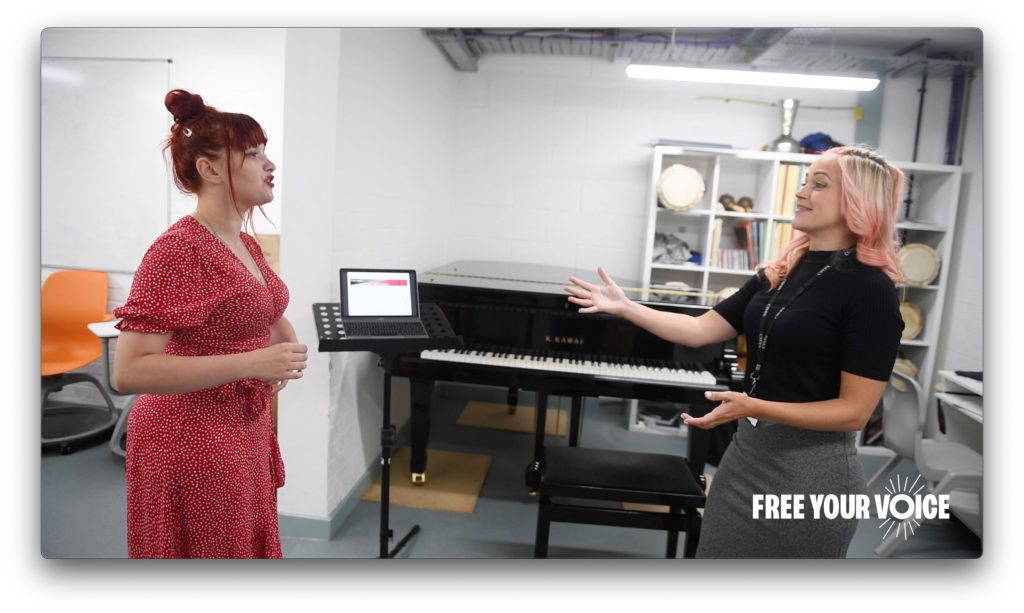What Vocal Confidence Means for You?
Finding confidence in your voice, whether you’re aiming to sing with more flair at London’s vibrant open mics or want to speak clearly at a community event in Cambridge, often feels like a hurdle only “naturals” get to leap. I know all too well how intimidating it is to step up and share your sound, especially when nerves have other ideas. At Free Your Voice Hub, vocal confidence isn’t just for the so-called “talented few.” It’s a journey you can start wherever you are, with whatever voice you have—whether you fancy belting out pop hits, serenading with jazz, rocking out, or simply being heard at your local festival.
I’ve seen countless singers, speakers, and even shy first-timers in Cambridge and London walk through my doors believing they couldn’t do it. With some honest guidance and a bit of practical technique, things start shifting fast. Let’s break down the practical steps to help you feel good about your voice, and understand that growing vocal confidence isn’t some secret trick—it’s about knowledge, support, and a bit of playfulness.
Why We Lose Our Nerve—and How to Get It Back
I’ve stood on iconic stages and also sweated through dodgy pub back rooms, so trust me, even professionals trip up with nerves. The problem? We pick up all sorts of beliefs about what our voices should sound like. Maybe you were told at school to mime in the back row, or perhaps you fumbled at a local open mic and never went back. These moments plant seeds of self-doubt that, over time, grow into big barriers.
At Free Your Voice Hub, we take the sting out of these stories. Your voice is as unique as your fingerprint, and what matters is learning how to use it safely, healthily, and with your personality intact. No bland “sing like everyone else” rules here. We celebrate every accent, every wobble, every vocal quirk—whether you’re prepping for Glastonbury festival or speaking at a charity bash.
Building Vocal Confidence: The Steps That Work
So, what do we actually do to find and grow vocal confidence? Here’s my tried-and-tested approach from working with everyone from school kids trying their first solo to grown-up professionals about to lead a company meeting.
1. Know Your Instrument
You wouldn’t gig without tuning your guitar. Your voice deserves the same care. That means getting a grip on vocal anatomy and how your sound is actually made.
Breathe Right: Most tension starts with unhelpful breathing. Practice a slow inhale, feeling your belly expand, then release the breath gently. It sounds simple, but this keeps your sound supported and reduces nerves.
Check Your Body: Clenched jaw? Scrunched shoulders? These habits can make your voice sound weak or shaky. A quick body scan before you sing or speak can work wonders.
Stay Hydrated: Dry throats (hello, festival beer tents!) never help. Water is your vocal best mate.
2. Ditch the Judgement
We’re constantly told there’s a “right” and “wrong” way to use our voices, especially in high-pressure spaces like auditions, boardrooms, or open-air stages in Cambridge. My mantra for every session is: there is no wrong voice. Yes, technique matters. But confidence comes from letting go of other people’s expectations.
Experiment with Style: Fancy a bit of vibrato? Want to try a rocky growl? Our sessions, using Complete Vocal Technique (CVT), make these effects accessible without straining your voice.
Mistakes are Progress: The best breakthroughs come from wobbles, duff notes, even a croaky shout. Each one teaches you something new about your instrument.
3. Practice, But Make it Playful
Repeating soulful scales in your bedroom is fine, but let’s be honest: it can get a bit dry. What works better? Mixing up your vocal exercises so they mirror real-life situations.
Sing or Speak in Different Modes: Try your favourite line as if you’re chatting to a mate, then amp up the energy like you’re hosting a festival.
Record Yourself: Listen back, not to criticise, but to notice what’s genuinely you. What bits do you like? What would you tweak next time?
Improvise: If nerves bite, allow yourself to play. Mash up lyrics, change melodies, try new phrasing. It’s how personal style is built.
4. Small Stages, Big Wins
If the thought of performing or speaking out loud makes your stomach churn, know that you’re in great company. The answer isn’t to leap onto a massive London stage straight away.
Find Safe Spaces: Our workshops and group classes (ideal for ages 8 and up) are designed just for this. Low-pressure, friendly faces, lots of encouragement.
Celebrate Tiny Steps: Whether it’s asking a question in a class, singing a chorus to your dog, or joining an open jam in your local, these count. Every outing builds muscle and resilience.
Community Matters: People blossom quickest when they have support. That’s why our sessions (both at our Cambourne studio and online) always focus on connection and encouragement.
5. Address Performance Nerves Head-On
Stage fright isn’t a sign you’re not cut out for performing or public speaking. Brains are hardwired to throw in the jitters. Rather than fight it, I guide our singers and speakers through specific techniques:
Grounding Techniques: Simple mindfulness or grounding exercises before performing can calm those butterflies.
Visualisation: Imagine yourself succeeding. Not just the applause—picture nailing the first note or connecting with just one audience member.
Breath-Reset: A well-timed deep breath can reset shaky nerves in seconds.
With these in your pocket, you can handle anything—including those unpredictable moments at a packed festival or a crucial work presentation.
Why Tailored Support Makes a Difference
I understand how different every voice and journey is. That’s why all our lessons and workshops—from pop and rock to public speaking—are designed around you. Trying to fit your voice into a box rarely works; you need someone on your team who gets it. At Free Your Voice Hub, we stay up to date on the science of vocal health and always weave the latest techniques from our ongoing training into every session.
That passion for continued learning means you’re never getting recycled “old-school” singing advice here. We use [evidence-backed vocal methods and creative coaching] (https://www.freeyourvoicehub.com) to keep things fresh and effective. If you’re looking to smooth out hoarseness, handle advanced vocal effects, or simply speak up in meetings, our tailored approach means you won’t get lost in a crowd—whether you’re a seasoned performer or starting from scratch.
Next Steps: Start Your Vocal Confidence Journey
You don’t need to be a chart-topper or keynote speaker to work on your vocal confidence. All it takes is a little curiosity and the right support network. Start with the basics we’ve listed here—test out a few daily vocal warm-ups, practice speaking or singing out loud, and remember, building confidence is about progress, not perfection.
If you’re ready for a nudge, or you want expert feedback that’s supportive and judgement-free, [check out our lessons and workshops](https://www.freeyourvoicehub.com). We offer sessions for everyone—kids, adults, total beginners, and seasoned pros—in London, Waterbeach, Chelmsford, Mildenhall, Cambridge, and Littleport plus flexible online options so you can join in from anywhere.
There’s never a wrong time to start building that vocal confidence. Your community (and your audience) will thank you for it. Let’s make sure your voice gets the love, attention, and confidence it deserves.

